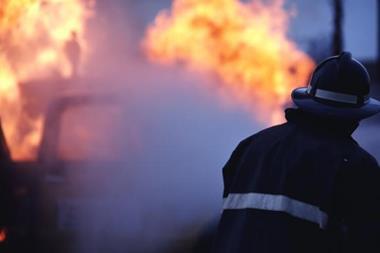Report says best option is to convert the plutonium into a fuel for nuclear reactors
The potential consequences of a major security breach or accident involving the UK's stockpile of separated plutonium are so severe that the government should urgently develop and implement a strategy for its long term use or disposal warns a new report published by the Royal Society.
According to the report the UK's civil stockpile of separated plutonium is now over 100 tonnes and has almost doubled in the last 10 years. The UK's stockpile is largely the by-product of commercial reprocessing of spent fuel from UK power plants.
Plutonium is highly toxic. It is the primary component in most nuclear weapons and could be made into a crude nuclear bomb by a well-informed and equipped terrorist group.
Professor Geoffrey Boulton, chair of the report's working group, said: "The status quo of continuing to stockpile separated plutonium without any long term strategy for its use or disposal is not an acceptable option. The Royal Society initially raised concerns about the security risks nine years ago and we have not seen any progress towards a management strategy. Furthermore, the stockpile has grown whilst international nuclear proliferation and terrorist threats have increased.
"Just over 6kg of plutonium was used in the bomb which devastated Nagasaki and the UK has many thousands of times that amount. We must take measures to ensure that this very dangerous material does not fall into the wrong hands."
“The status quo of continuing to stockpile separated plutonium without any long term strategy for its use or disposal is not an acceptable option
Professor Geoffrey Boulton, chair of the report's working group
The report recommends that a strategy to manage the UK's separated plutonium must be considered as an integral part of the energy and radioactive waste policies that are currently being developed.
According to the Royal Society's report, currently the best option is to convert the plutonium into the most stable and secure form spent nuclear fuel by turning it into Mixed Oxide (MOX) and using as fuel in nuclear reactors. This would make it more difficult to steal because spent fuel is more radioactive and therefore harder to handle than plutonium and more difficult to use in nuclear weapons because it would need to be reprocessed first.
If the government decides to build a new generation of nuclear power stations then the entire stockpile could be burnt as MOX fuel in these new reactors.
If there is no new nuclear build, at least some of the stockpile could be transformed into spent fuel by modifying Sizewell B to burn MOX fuel. However because of the limited life time of Sizewell B, not all the stockpile could be burned. The report recommends that the remaining separated plutonium should be converted and stored as MOX fuel pellets. These pellets would make the plutonium more secure than it is currently, but less safe than spent fuel.
In the long term the best method of disposing of the UK's separated plutonium stockpile will be to bury it deep underground in the form of spent fuel, or, less ideally, MOX pellets. It is essential that the government's strategy for developing such a repository for nuclear waste includes an option for the disposal of separated plutonium and materials derived from it. However the report stresses the urgency of the government developing a strategy for dealing with separated plutonium in the meantime since, according to the Nuclear Decommissioning Authority, disposal sites for high-level waste may not ready until around 2075.



















No comments yet